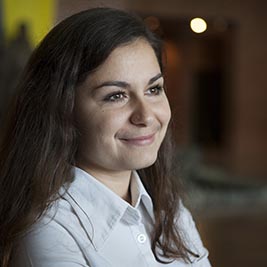Bank of Portraits / Dzhyvulsky Vasyl, Maryna, Kateryna, Anastasia and Pavlyna

Dzhyvulsky Vasyl, Maryna, Kateryna, Anastasia and Pavlyna
Vasyl and Maryna Dzhyvulsky were residents of the village of Rublyne (now Rublyn village) in Ternopil region. Their daughters Anastasia, Kateryna and Pavlyna lived with them, and married Hanka lived in a neighboring village. In the fall of 1941, during the German occupation, Vasyl Dzhyvulsky was approached by Ita Kirshenbaum, whose father he once worked for. She asked if the Dzhyvulsky family, who by their religious beliefs belonged to Evangelical Christians, would be willing to hide her and her family in their house for money, if necessary. Vasyl willingly agreed.
Soon, Ita Kirschenbaum with her young daughter Tsypora and her relatives - brother Getzel Strauber with his wife Malka and daughter Genia-Tova, sister Sosya Petrover with her husband Shaya and daughters Esther and Miriam, as well as Michael Ehrlich, Ita's son-in-law - moved to the Dzhyvulsky house. They were later joined by Avraham Kupferman with his wife Freema and two children. All 14 Jews were hidden in the stable.
The family of Dzhyvulsky brought food to the wards in a basket and did everything possible to make them feel good. Since the conditions in the hiding place were unsuitable for the baby, Vasyl and Maryna took 18-month-old Tsypora into their house and introduced her to their acquaintances as their granddaughter - Hanka's daughter. The Dzhyvulskis spent the money they received on buying food for a large Jewish family. With its appearance in the house, food purchases increased, and this could cause suspicion in the village, so the couple regularly went to the nearby village of Zoloty Potik for food. Eventually, the Jews ran out of money, and they began to suffer from hunger. Then Vasyl and Maryna began to collect corn in the field at night and fed their wards with it.
In March 1944, the line of the Soviet-German front began to approach the village. However, many German soldiers remained on its outskirts, so the Dzhyvulskis continued to provide the Jewish family with bread and dried fruit, thereby saving it not only from hunger, but also from the need to leave the shelter.
After the expulsion of the Nazis from the village of Rublyn on April 14, 1944, the surviving Jews left the Soviet Union, and the Dzhyvulsky family was deported to Siberia by the Bolsheviks.
In the 1960s, Ita Kirschenbaum, who had moved to Israel at that time, reconnected with the Dzhyvulskis.
On December 19, 1974, Yad Vashem awarded Vasyl and Maryna Dzhyvulski with the honorary title "Righteous Among the Nations." On June 11, 2001, it was also received by Anastasia Pavlyshyna (Dzhyvulska), Kateryna Dzhyvulska and Pavlyna Kuzevych (Dzhyvulska).

Nadiya Simperovych
Kyiv
National museum of the History of Ukraine in the Second World War
-
fingerprintArtefacts
-
theatersVideo
-
subjectLibrary

